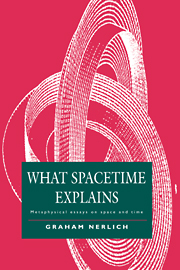11 - How to make things have happened
Published online by Cambridge University Press: 19 October 2009
Summary
Introduction
Might something I do now make something have happened earlier? This paper is about an argument which concludes that I might. Some arguments (Dummett 1964; Scriven 1957) about ‘backward causation’ conclude that the world could have been the kind of place in which actions make things have happened earlier. The present argument says that it is that kind of place: that we actually are continually doing things that really make earlier things have happened. The argument is not new (see e.g. Taylor 1964). It sees temporal direction as logically independent of any direction which necessary and sufficient conditions may have, and it sees causal direction as properly deriving from the latter. Thus the directions of time and of making things happen need not coincide and, as it turns out, do not actually coincide in fact. There are examples of events which are sufficient, in a suitably rich sense, for the occurrence of earlier events; hence they make the earlier events happen. My purpose in this paper is to lend support to the argument by filling in some details which ‘backward sufficient conditions’ may lay claim to. But in one direction I reduce the content often claimed for ‘sufficient condition’ by omitting all use of modal expressions. This avoids many of the criticisms which have been levelled at Taylor (1964), for example.
The strategy of the argument is simple enough: decompose the causal relation into component relations, replace the component ‘later than’ by ‘earlier than’ throughout and find instances of the new complex of relations. In fact, there seem to be many instances.
- Type
- Chapter
- Information
- What Spacetime ExplainsMetaphysical Essays on Space and Time, pp. 247 - 272Publisher: Cambridge University PressPrint publication year: 1994



